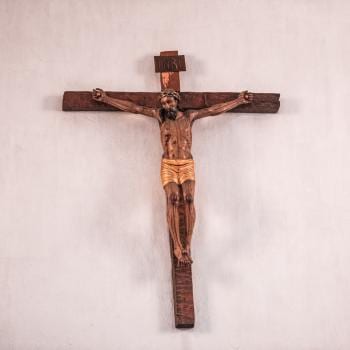There’s a Slate article trending on Twitter this morning called “America is a Sham.” It’s full of a lot of words I’d rather not use on this blog, and is a jumble of both interesting insights and, I think, rather naïve economic aspirations. Yes, when the coronavirus is over, we should be happy that we were able to see that the number of ounces of liquid you carry on to an airplane in no way makes any of the people on that airplane safer. But no, nothing is really “free.” If you want the government to give you things—even things you need—you will still pay some kind of a price, no matter how poor you are, a price that may seem low now that you need them, but will not always appear to be that way. The government will enact payment eventually, it always does. Maybe it won’t be money, but it will be something.
That is the thing uppermost on most of our minds just now—how far are most of us willing to go to procure that which we most need. This guy, who went around from one state to another buying up all the hand sanitizer, hoping to make it big. Me, wandering around town looking for loo paper not in order to stockpile it, but because I need it now…and finding that there is none. Doctors, frustrated about there not being tests. So many people could have this wretched disease, but there is no way to find out. The crisis presses each person to consider the substance and measure of his life in the most immediate and intimate ways. And I don’t know about you, but whenever I do that, it is the lack of the thing that rises uppermost not only in my mind, but in my body.
Providential, then, that the lections today are about Israel in a desperate and helpless place, and how they behaved when they found themselves there.
All the congregation of the people of Israel moved on from the wilderness of Sin by stages, according to the commandment of the LORD, and camped at Rephidim, but there was no water for the people to drink.
I have often tried to imagine it. Thousands and thousands of people. Babies hauled along on people’s backs. Various kinds of animals. Cartloads of stuff. The dust. The noise. Not at all the kind of pictures of crowds I’m used to seeing say, in the New York Subway—all be-headphoned and modern and sleek. No, more like the caravans of people trying to make it out of Syria, or into Europe. And mind you, they’re all journeying on in stages because God told them to. They obeyed, and here they have no water.
That’s usually the way it is. You do what you’re supposed to, and something terrible happens. You get sick, or you lose all your money, or your car breaks down, but it was while you were being kind, or frugal, or doing whatever it was you thought God wanted (or the universe, if you don’t believe in God). And then suddenly you are in that curious and desperate place where you yourself are about to measured.
Therefore the people quarreled with Moses and said, “Give us water to drink.” And Moses said to them, “Why do you quarrel with me? Why do you test the LORD?” But the people thirsted there for water, and the people grumbled against Moses and said, “Why did you bring us up out of Egypt, to kill us and our children and our livestock with thirst?”
I always read this and laugh—how could they be so foolish—and then go down and scream at the entire world in disappointment and rage because my blood sugar is low and there’s nothing I feel like eating. Observe how the people of Israel go about their quarreling. First, they demand water of Moses. Then, when Moses questions them, asking why they thus quarrel, pointing out to them that their issue is not actually with him, but with God, they rage against him, accusing him of trying to kill them. It’s an interesting little circle of hubris, and it illuminates the human heart most painfully. In one awful moment, in the midst of their thirst, they appear to accuse Moses, but are really bitterly angry with God for bringing them to a place they find they cannot endure.
And who can really blame them, for they are thirsty. Most of us don’t really know this kind of desperate thirst. I recently figured out how to make tea in a big insulated thermos that really keeps it hot for the whole day. I’ve taken to lugging it around with me, indecently attached to its whereabouts in my spatial and material circumstances, frantic when I put it down and can’t remember where. All day I sip at it, the steady flow of caffeine my sure and certain promise that I will be able to cope as I go through the day. We thirst in all kinds of ways, individually, and all together, but there’s nothing that beats that desperate parched sensation when you look out over the desert, or a whole case full of cold drinks, and there is nothing to drink, or you are paralyzed by indecision. What can you then do, but rail against God?
I mean, of course, there is another option, but this is the core of the issue. When you face some terrible lack, some sorrow, some trauma, some deep, unassailable need that you have no power to quench or meet, what do you do? If you are an unbeliever (and really, so many of us are) you complain—angrily. You are bitter in your anger. It goes deep and fast to the darkest and foulest places of hell. Why does God hate me, you say. It is your first and most powerful assumption.
I mean, I do too. It’s not just you. It is the entire world. And, in a time like coronavirus, the cacophony of our need and fear might feel a touch overwhelming. The word “panic” is easily au courant. But maybe it’s not coronavirus, maybe its something else, like what you thought God was going to do, or that you wanted something and you didn’t get it, or you didn’t want something, and are having to endure it. No human life escapes this experience.
So Moses cried to the Lord, “What shall I do with this people? They are almost ready to stone me.” And the LORD said to Moses, “Pass on before the people, taking with you some of the elders of Israel, and take in your hand the staff with which you struck the Nile, and go. Behold, I will stand before you there on the rock at Horeb, and you shall strike the rock, and water shall come out of it, and the people will drink.” And Moses did so, in the sight of the elders of Israel. And he called the name of the place Massah and Meribah, because of the quarreling of the people of Israel, and because they tested the LORD by saying, “Is the LORD among us or not?”
Which is why Moses is called the meekest of all people on earth, that he did what the people themselves could have done but didn’t, that he does what any of us could do, which is go immediately to God for help. In this case, it’s not even water that he asks for, but for the unburdening of the people who are ready even to kill him. He does what they should have done—Ask for what they need.
I mean, I get it. Asking for help is humiliating. It’s easier to demand in anger, than ask in desperation. I know, because I’ve tried both, and neither is very pleasurable. Asking in humility means admitting a lot of things I just don’t want to even deal with. The very idea of being thirsty—thirsty enough to die—is appalling to me. Better that I go around “doing the best I can” than to implore God to come and sort out the myriad problems, to meet the abundant needs that are beyond my control.
But look what happens when Moses asks God for help. This is so curious, and so terrible. God gives Moses—and the people, incidentally, though they don’t really see what is happening—the central image of the believing life. There is a rock, and Moses is to strike the rock, and water will come out of the rock, and the people will drink. But standing before the rock is, lest you think this is some sort of magic act, God himself. He stands before the rock, so that when the rock is struck, it is really him. When the water bursts forth, it is out of him.
Honestly, it isn’t fair. If I were God, and everybody was yelling at me, I would strike them. And yet he himself is the one who takes the blow.
Like I said, everything comes at a cost. There is nothing free in the universe. Someone pays. When anger, disappointment, and ruinous need fill the throats and mouths of humanity, God himself pays whatever is required, and gives the thing most desperately needed—salvation, water, faith, and worst of all, himself.











